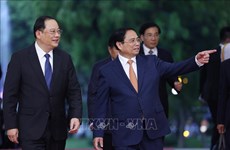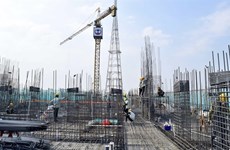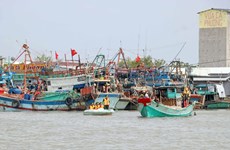TPP – driving force for economic development
The Trans-Pacific Partnership Agreement (TPP) is a driving force for
development of Vietnam’s economy that requires the business
community’s commitment, said an expert.
The Trans-Pacific Partnership Agreement (TPP) is a driving force for
development of Vietnam’s economy that requires the business
community’s commitment, said an expert.
Dr Dinh Thi My Loan, a member of the Advisory Committee on international trade policies, told VNA reporters on the sidelines of a Nov. 4 seminar on negotiation of TPP held in Hanoi that Vietnam’s participation in the TPP would offer local businesses opportunities to expand to markets that are partners of TPP – which is seen as a bloc with a strong economy and an important role.
With strong commitments to market opening including exemption of many import tariffs and opening the door for services, the TPP would also be able to help Vietnam increase exports and services and complete its legal system.
“Once being signed, the TPP will surely have an effect on the business prospects of the country’s economic sectors and branches,” Loan said.
According to the expert, the TPP is a comprehensive free trade deal that sets higher requirements than WTO, so besides more opportunities, it also poses more challenges to Vietnamese firms.
Therefore, consultancy for negotiations needed more attention in order to prevent negative impacts on made-in-Vietnam products as their competitiveness is still low, she said.
Vietnam is conducting negotiations on the TPP with Singapore , Brunei , Australia , the US , New Zealand , Chile and Peru . The TPP is expected to stimulate growth for businesses that operate in the Asian-Pacific region, which is seen as one of the world’s most dynamic markets.
According to the Vietnam Chamber of Commerce and Industry (VCCI), Vietnam, together with ASEAN, has to date signed and implemented FTAs with six major partners, including the ASEAN-China Free Trade Agreement (ACFTA), the ASEAN-RoK Free Trade Agreement (AKFTA), the ASEAN-Japan Comprehensive Economic Partnership (AJCEP); the ASEAN-Indian Free Trade Agreement (AIFTA) and the ASEAN-Australia-New Zealand Free Trade Agreement (AANZFTA).
Generally, FTAs bring big benefits in terms of export. However, Vietnam ’s exports are mainly raw materials with low or zero tariffs and export values are not high, leading to less improvement in the country’s trade deficit with FTA partners./.
Dr Dinh Thi My Loan, a member of the Advisory Committee on international trade policies, told VNA reporters on the sidelines of a Nov. 4 seminar on negotiation of TPP held in Hanoi that Vietnam’s participation in the TPP would offer local businesses opportunities to expand to markets that are partners of TPP – which is seen as a bloc with a strong economy and an important role.
With strong commitments to market opening including exemption of many import tariffs and opening the door for services, the TPP would also be able to help Vietnam increase exports and services and complete its legal system.
“Once being signed, the TPP will surely have an effect on the business prospects of the country’s economic sectors and branches,” Loan said.
According to the expert, the TPP is a comprehensive free trade deal that sets higher requirements than WTO, so besides more opportunities, it also poses more challenges to Vietnamese firms.
Therefore, consultancy for negotiations needed more attention in order to prevent negative impacts on made-in-Vietnam products as their competitiveness is still low, she said.
Vietnam is conducting negotiations on the TPP with Singapore , Brunei , Australia , the US , New Zealand , Chile and Peru . The TPP is expected to stimulate growth for businesses that operate in the Asian-Pacific region, which is seen as one of the world’s most dynamic markets.
According to the Vietnam Chamber of Commerce and Industry (VCCI), Vietnam, together with ASEAN, has to date signed and implemented FTAs with six major partners, including the ASEAN-China Free Trade Agreement (ACFTA), the ASEAN-RoK Free Trade Agreement (AKFTA), the ASEAN-Japan Comprehensive Economic Partnership (AJCEP); the ASEAN-Indian Free Trade Agreement (AIFTA) and the ASEAN-Australia-New Zealand Free Trade Agreement (AANZFTA).
Generally, FTAs bring big benefits in terms of export. However, Vietnam ’s exports are mainly raw materials with low or zero tariffs and export values are not high, leading to less improvement in the country’s trade deficit with FTA partners./.












